Pacific Island Countries (PICs) have legal rights to and within enormous ocean areas. These legal rights are, to a large extent, provided by operation of international law and are codified in the 1982 Law of the Sea Convention (LOSC).
The LOSC is often referred to as a “Constitution for the Oceans” because, amongst other things, it sets out and regulates the recognised legal rights that the international community agree that all nations have on or in the ocean to undertake or benefit from various activities that include but are not limited to navigation, fishing and other extractive industry. The LOSC also allocates the legal rights to PICs over and within ocean “zones” that includes the large Exclusive Economic Zones (EEZs). However, fisheries and marine scientists suggest that the sustainable use and management of the PICs’ valuable marine resources can only be achieved by Integrated Oceans Management based on eco-systems and not ocean zones.
In this legal bulletin we set out why the Pacific Island Countries have sufficient legal rights to build and implement effective oceans integrated management systems to support the development of their national and regional blue economies in a way that best suits them and based on an ecosystems approach. However, to meet good governance outcomes (successful, equitable, sustainable) those management systems must be suited to the context of PICs which means that the collective process to create those systems must be inclusive, practical and carefully undertaken.
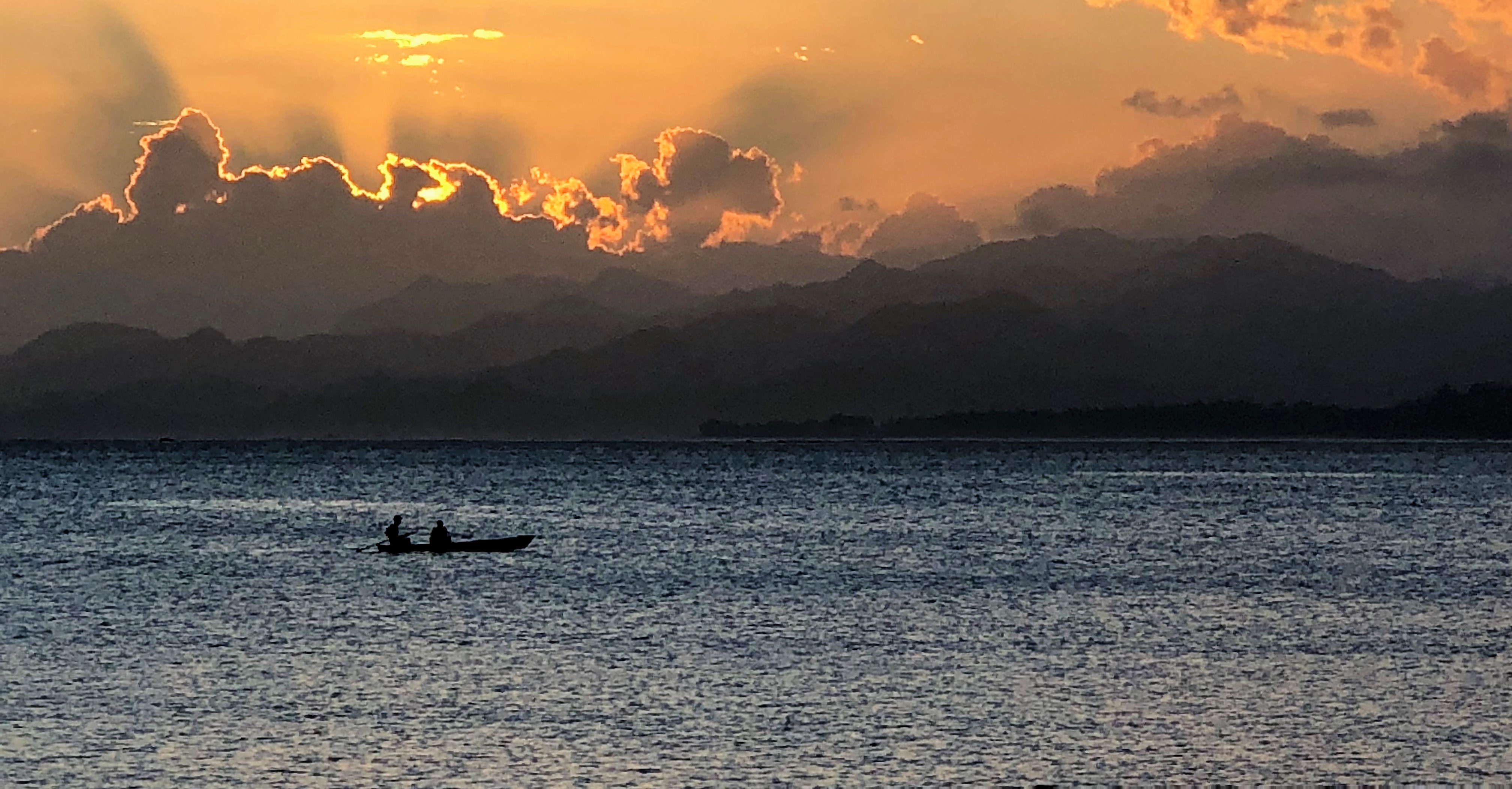
In the Pacific, the cultural importance of the ocean extends well beyond legal rights, but it is these legal rights that preserve the ability for Pacific Island Countries and their citizens to benefit from and protect vast areas of ocean space in the face of growing global development pressures. This legal bulletin briefly addresses some of the legal rights that Pacific Island Countries have in their oceans that were shared in a panel discussion hosted by Oxfam in the Pacific as part of their Raising Pacific Voices initiative in conjunction with the Pacific Regional NGO Alliance, Pacific Disability Forum and Oceania Centre for Arts , Culture and Pacific Studies, Laucala Campus, USP at the Oceania Centre.
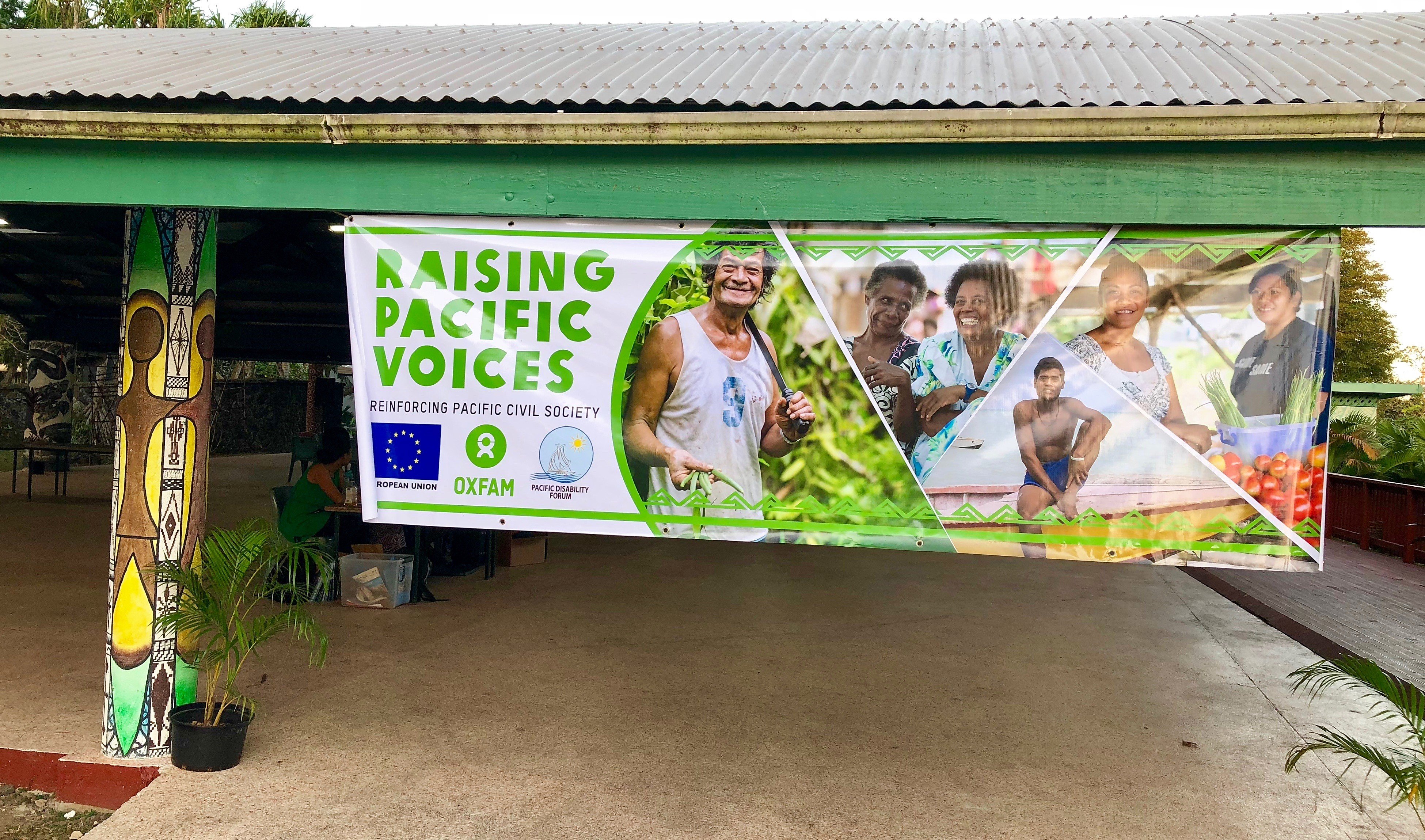
This legal bulletin addresses some of the issues that that were discussed in a panel discussion hosted by Oxfam in the Pacific as part of their Raising Pacific Voices (RPV) initiative in conjunction with the Pacific Regional NGO Alliance, Pacific Disability Forum and Oceania Centre for Arts , Culture and Pacific Studies, Laucala Campus, USP at the Oceania Centre.
The panel was asked to address what the inclusive Blue Economy looks like, and while this will be a decision for PICs, from a legal perspective whatever Blue Economy is adopted it will be built upon legal rights to ocean spaces and the natural resources that they contain. In the South Pacific ocean the most important and renewable resource (if managed correctly) is fish. The sustainable management of Pacific fisheries is an enormous challenge in the face of global demand and other factors but it is vital to overcome these challenges if successful blue economies are to be established.
The legal rights to ocean spaces that Pacific Islands enjoy
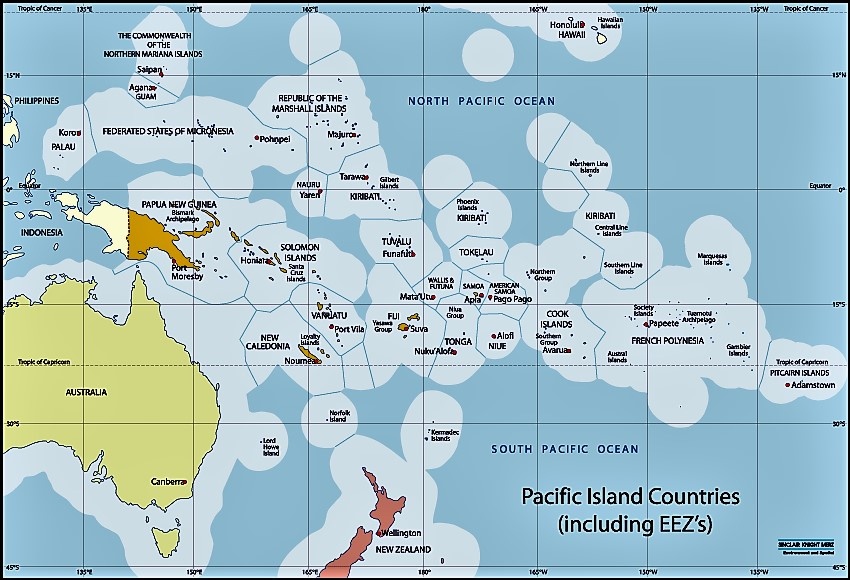
Ocean map of the South Pacific showing the EEZs of PICs
Legal rights are the foundation upon which economic rights are built.
The holder of the legal rights whether an individual or a group can decide how to exercise its legal rights and as a result how it wants to enjoy its economic rights. The legal rights holder can exercise constraint in the development of its economic rights and economic theory suggests that the legal rights holder will not want to harm the environment upon which the value of its legal rights depends. In terms of natural resource use this means that a well informed legal rights holder should decide that sustainable use of natural resources is the best way to maximise their benefit.
As the panel noted on a point raised by panel member Rev. James Bhagwan, Ownership of the rights to natural resources is often shared, and this is particularly true in the Pacific in areas of ocean closer to shore where traditional rights to resources and other resources are often balanced with the State’s rights to those resources and to licence others to exploit those resources in accordance with the law.
At present, Pacific Islanders (and the rest of the world) face unprecedented global threats to their oceans and resources from climate change, ocean acidification and pollution, and it is becoming increasingly realised that these problems will only be solved by everyone adopting common goals and cooperating to ensure those goals are met at an international, regional and national level.
For the Pacific, the key legal instrument that provides legal rights in ocean spaces is the LOSC and the main way that it does this is to create ocean zones that may include:
- Internal Waters
- Archipelagic Waters (in the Pacific PNG and Fiji are in line with LOSC recognised as Archipelagic States in possession of Archipelagic Waters)
- Territorial Sea
- Exclusive Economic Zone (EEZ)
- Continental Shelf.
As a consequence of LOSC all Pacific Islands enjoy legal and economic rights over, within and beneath vast areas of ocean and seabed. The legal authority that Pacific Island Countries have in these areas depends on the area or zone.
For Internal Waters, Archipelagic Waters and the Territorial Sea (which extends 12 nautical miles from the low water mark or in the case of Archipelagic States from the Archipelagic baselines), PIC’s enjoy the rights that come with complete territorial sovereignty. This means that the PIC’s have the legal authority to adopt their own laws regarding the exploitation and protection of their natural resources.
In terms of the EEZs and the natural resources within their enormous EEZs (which may stretch up to 200 nautical miles from their coasts or baselines) PICs have sovereign rights to exploit or protect/manage the natural resources that within these areas at any given time.
The difference with natural resources within EEZs is that PICs can regulate the way that their resources including fish are caught but they must also allow fishing vessels from other States access to those resources where the PICs do not have the capacity to capture the resources up to limits determined by fisheries scientists, known as the Total Allowable Catch (TAC). This international law requirement, along with other factors that make it difficult to regulate fishing vessels from outside the Pacific, and the relative economic weakness of PICs and strong consumer demand for relatively low prices for wild caught fish means that Pacific Islanders are not, at present, receiving sufficient economic benefit from their legal rights.
The term blue economy is a fairly recent one, that is defined by the World Bank as the "sustainable use of ocean resources for economic growth, improved livelihoods and jobs, while preserving the health of ocean ecosystem." However, the term can mean expansion of the maritime sector without regard for sustainable use of resources.
Whatever the term is interpreted to mean, for the Pacific Islands and for Fiji, where the author is based, it should be obvious that the health and well-being of all citizens of the PICs is dependent upon clean and healthy oceans. The economic benefits are not only derived from natural resource extraction but present other opportunities, not least, tourism from people who come here expressly to swim in the ocean and experience what are hopefully pristine marine ecosystems.
The legal rights that have been bestowed on PICs provide the requisite authority and tools and international legal backing to effectively regulate and conserve the marine resources within their ocean zones. However, simply relying on the LOSC will not achieve this.
Instead PICs may be well advised to individually and collaboratively design and plan the use of their ocean spaces to ensure their sustainable use and provide their areas of oceans and resources the best chance of adapting to the large global threats to their health.
To do this, PICs have the legal authority to introduce sustainable management measures that include, but are not limited to:
- the creation of Marine Protected Areas (MPAs)
- Exercising precaution (erring on the side of caution or the precautionary approach) when deciding whether to approve new extractive industry applications where the effects on the environment are simply not known or uncertain to science
- Planning and deciding what uses should be permitted and where in their ocean spaces within the limits of international law (Marine Spatial Planning or MSP).
- Basing management of natural resources on the basis of eco-systems and not ocean zones (fish swim and in law are a common pool resource that in their uncaptured state belong to noone)
- Collaborating as much as possible with all State or Regional institutions and decision-makers and CSOs, communities and other stakeholders to make better and more inclusive decisions regarding the use of ocean resources.
In this way PICs can build on their legal rights to the ocean and better meet their legal obligations that are also contained in LOSC (Articles 192 and 193) which includes the obligation on all States to protect and preserve their marine environments.
In saying this, it should also be recognised that many of the PICs' governments and leaders in all areas are doing more to meet their international obligations to protect and preserve the marine environment and are actively calling for the International community and other States to do more. Further many CSOs, national governments in the region and regional development organisations, Regional Fisheries Management Organisations and International Bodies like the UN are working at local, national, regional and international levels to promote oceans governance.
Further at a community level, it is common in the Pacific that traditional fishing rights or grounds will exist close to shore. The traditional rights may be integrated within and recognised in law and/or policy to some extent within the national legal framework that leads to some sharing of the rights between communities and the State. How valuable these traditional rights are, in practical or legal terms will be dependent on the health of the coastal resources. This in turn will depend on many factors that include, but are not limited to, terrestrial use of land, fishing practices both nearshore and offshore, and pollution levels.
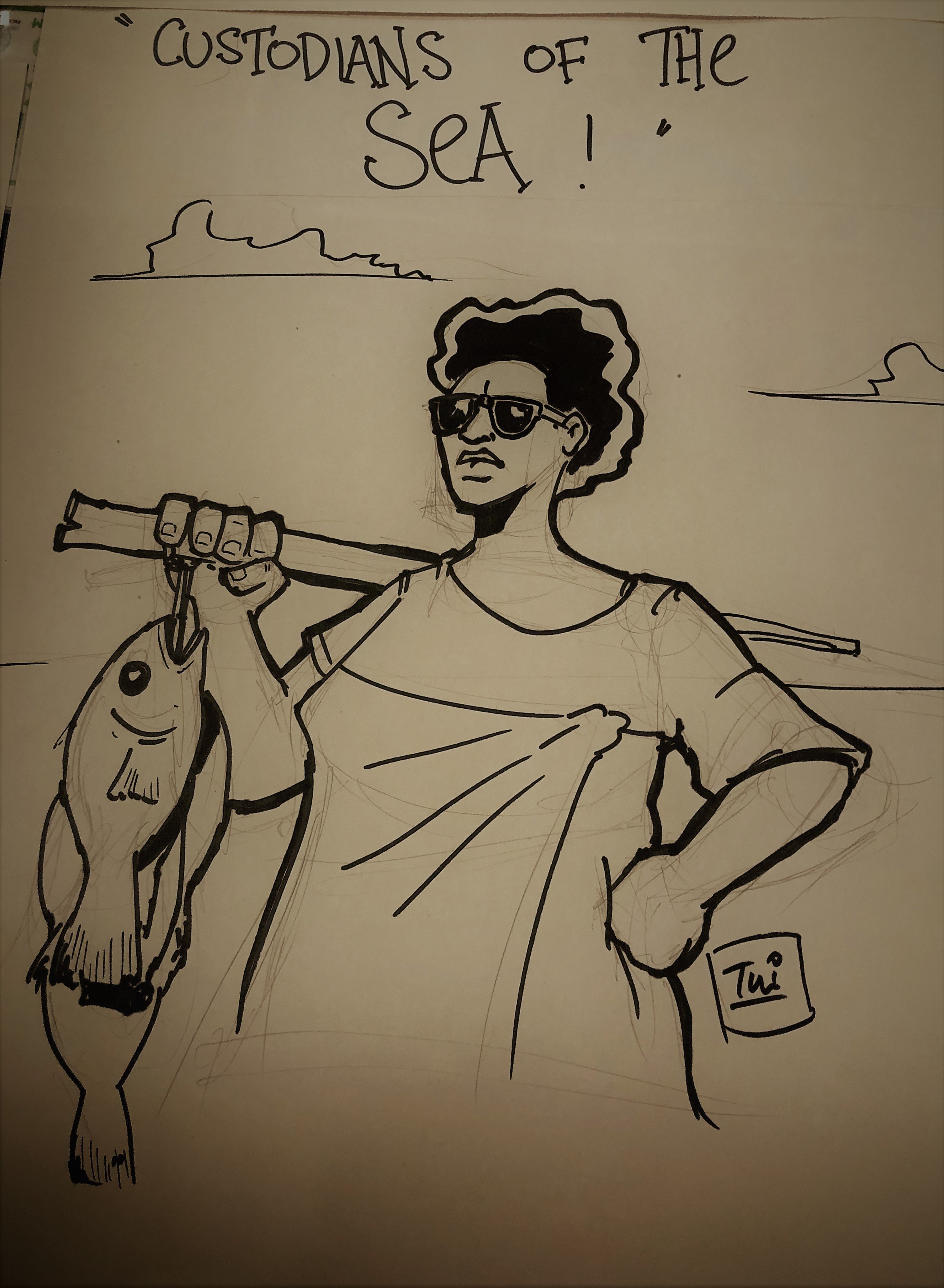
Art by Tui (Suva based artist)
The vital role of Civil Society Organisations (CSOs)
At the panel discussion, it was asked what more can CSOs do at all levels to promote the blue economy and at community level in particular. It is fair to say that CSOs are already doing a great deal in this area and this includes, but is not limited to:
- Providing technical knowledge and capacity to PICs' government departments which may be well-intentioned but are typically not well resources and stretched with little time to utilize critical analysis and technical skills to manage the marine environment. CSOs provide an important backstop for proper environmental regulation and implementation of environmental laws and policies in addition to proper environmental management tools. In this role CSOs also have important data and tools to input into policy development
- Also at a national level CSOs can assist with national objectives of good resource management and eco-system based management, provide information to inform national decision making particularly in relation to what is sustainable resource use or the impacts of particular developments or decisions
- Finance: CSOs may bring in a host of finance arrangements for implementation of marine conservation and management that may not be offered directly to governments. This includes bilateral donor funding, philanthropy, and funding derived from the CSOs themselves
- Stronger community links/ alternative livelihoods: CSOs can often have the capacity to establish themselves in communities to develop and implement projects. They can also assist in developing alternative livelihoods or value adding in natural resource exploitation. By virtue of their closer links to the community CSOs can better represent the interests of communities and their needs to the government
- SDG 14: SDG 14 and its targets are key global tool to address the myriad of ocean problems we have today, i.e., climate change, overfishing, pollution, high seas/BBNJ, etc. Implementation of SDG 14 and tracking indicators is not possible by the government alone but needs robust contribution by CSOs
- CSOs also have the ability to work at the UN process level, where States may be more interested in protecting particular rights of navigation or are caught in disputes of territory, CSOs are able to provide technical knowledge, capacity, resources, data and tools to assist at a policy level, to promote the interests of PICs and provide scientific data to influence the States process.
It is also worth noting in relation to the above that all CSOs (and their funders) should appreciate that PICs' governments are frequently well-intentioned but under-resourced. It is therefore, vital, that CSOs focus on collaborative efforts around shared visions that take into account the practical effect on government Ministries and departments. For example, here in Fiji we have seen an excellent collaborative effort between CSOs and the Ministry of Fisheries that has led to a decision being implemented to ban the capture of certain popular coastal fish species during their breeding season. While science and assistance has been offered by CSOs, now that the ban has been implemented the burden falls on the Ministry on behalf of the State to monitor and enforce the ban and this can quickly overwhelm limited government resources.
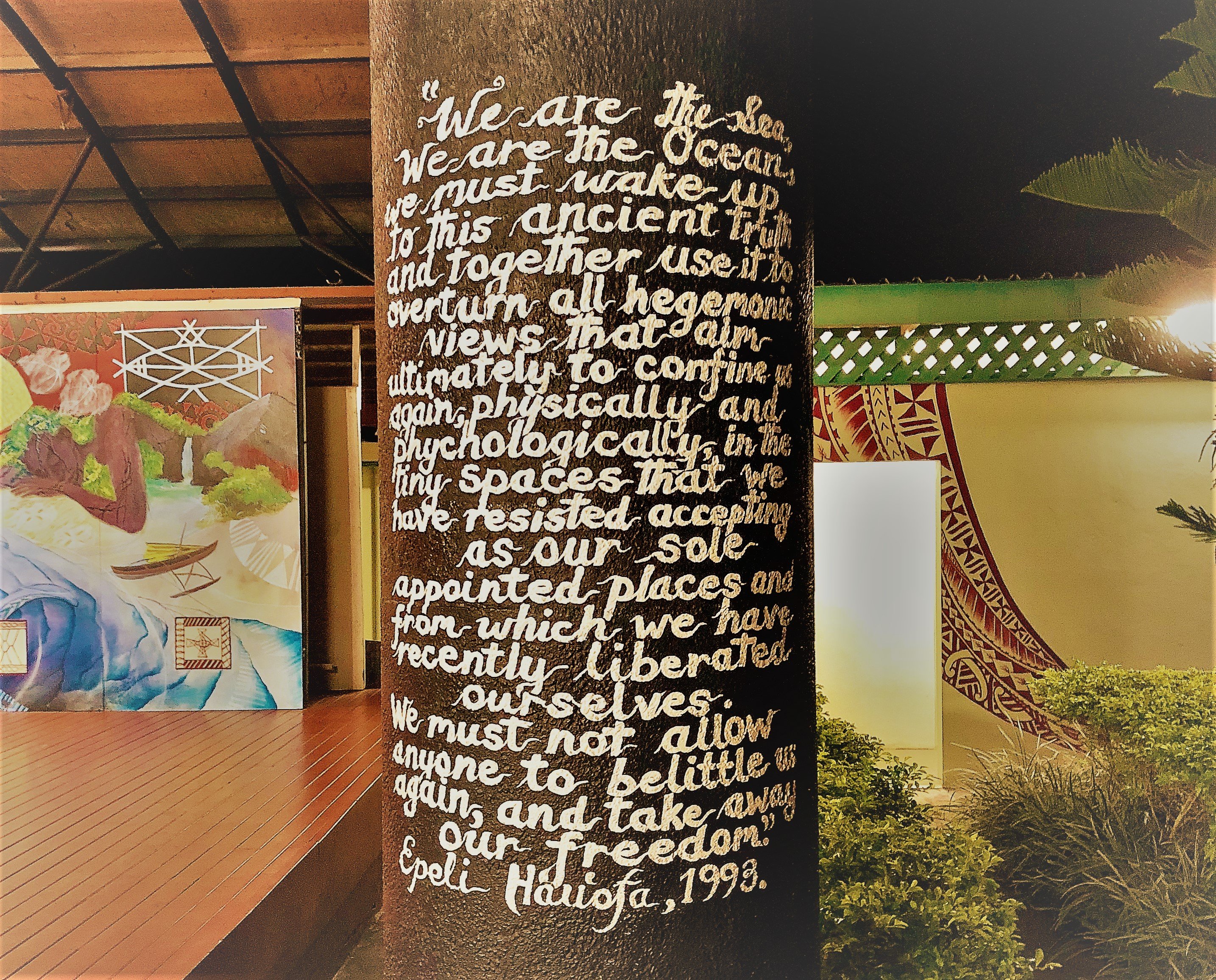
Concluding thoughts
While the LOSC is an impressive achievement, it does not provide a complete answer to oceans governance or how the benefits of oceans should be shared equally.
The LOSC does provides a sufficient bedrock of legal rights that PICs can build their national and regional systems of ocean governance upon to enable their oceans resources to be used sustainably and equitably.
For PICs to reach the goal of sustainable and equitable use of their ocean resources good national and regional decisions must be made, particularly around the area of integrated oceans management including marine spatial planning and on suitable internal governance structures that ensure the benefits are shared by all citizens.
However, good decisions require good decision-making processes and it is important that these processes are found at a national and regional level to ensure that the voices of all Pacific peoples and citizens are heard and taken into account along the way. The integration (or lack of) of institutional infrastructure at a global or international level for oceans is frequently pointed to as an obstacle to achieving effective integrated oceans management, however, as discussed, this international issue does not stop PICs developing national and regional integration via good decision-making processes.
CSOs will and must play an integral role in creating the decision-making processes and it is important that CSOs collaborate sufficiently between themselves to present a unified vision and effective technical support to the decisions made. It is also important that national governments and regional bodies and funding bodies invest in robust and inclusive decision-making processes.
Finally, it is essential that the integrated oceans management policies and processes to support PICs to develop blue economies are suited to context. This means they should be succinct, practical and include goals and principles that can unite PICs within a healthy ocean. Too often, too much detail is included in policy documents making them unwieldy and this can distract from the common goals and principle led approach and action that is so vital at this juncture.
With Thanks to:
Oxfam in the Pacific's Raising Pacific Voices (and its excellent team) for organising and hosting the Panel discussion with the support of with the Pacific Regional NGO Alliance, Pacific Disability Forum and Oceania Centre for Arts , Culture and Pacific Studies, Laucala Campus, USP at the Oceania Centre. The panel members were: Aliti Vunisea from the Women in Fisheries Network, Rev. James Bhagwan a Methodist Minister undertaking his doctorate at USP, Francois Martel from the Pacific Islands Development Forum and the author. The panel discussion was ably facilitated by Seema Ashwini Deo. More information about Oxfam in the Pacific's Raising Pacific Voices programme and the panel discussion (which addressed issues wider than those contained in this legal bulletin) can be found: here
And
Kevin Chand for reviewing a draft of this bulletin. Kevin has just joined Stanford’s d.school x Centre for Ocean Solutions as a teaching fellow and his profile can be found: here
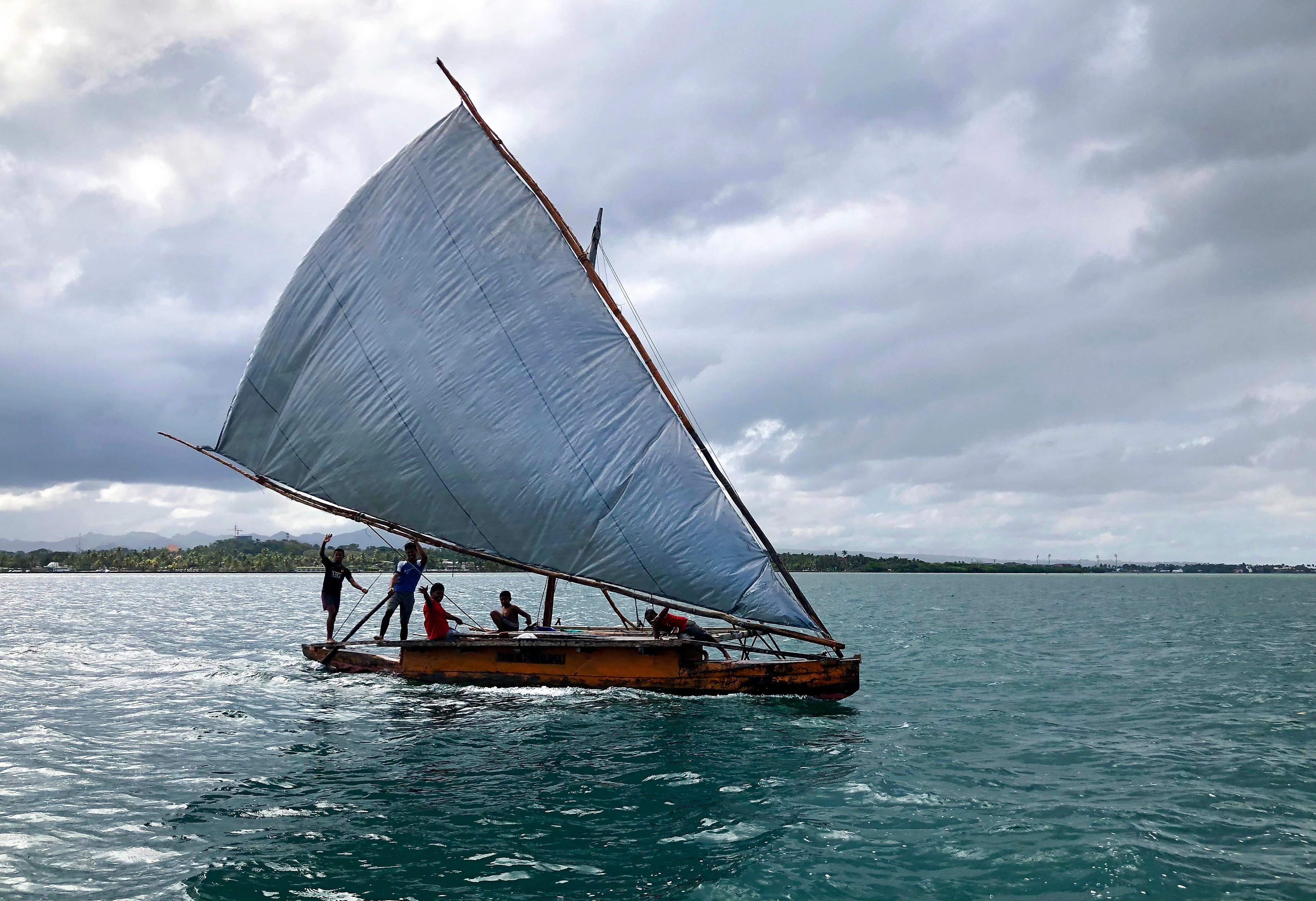
This legal bulletin is not, and should not be relied on as, legal advice. It is provided for information purposes only.



